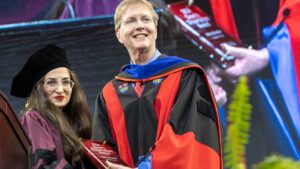Doctoral students cruise into roles as computer engineering innovators
“The program teaches you to be a leader.”
Raha Moraffah reflects on her experiences as a doctoral student in the School of Computing and Augmented Intelligence, part of the Ira A. Fulton Schools of Engineering at Arizona State University.
At the spring 2024 Fulton Schools graduate student convocation, Moraffah took to the stage to receive the Dean’s Dissertation Award for her groundbreaking work in artificial intelligence, or AI. After shaking hands with Kyle Squires, dean of the Fulton Schools, she was hooded by her mentor, Regents Professor Huan Liu, and walked off the dais a newly minted doctor.
Moraffah is part of the largest computer science graduating class in the history of the Fulton Schools. But she is also a testament to the school’s determination to foster excellence in its graduate programs.
- Read the full story about recent grads Raha Moraffah and Zahra Zahedi who are assuming sought-after roles in computer science.
- Learn more about our new Presidential Postdoctoral Fellow, Rolando Garcia.
Past doctoral students reflect on mentorship
Hongxin Hu, who earned his doctoral degree in computer science and engineering under the supervision of Gail-Joon Ahn in 2012, is currently a full professor at the University at Buffalo, SUNY. He says:
“Studying with Gail-Joon Ahn significantly prepared me for my career by providing me with a strong foundation in both theory and practical skills, which are essential in my research field. His dedication to mentorship fostered not only my academic growth but also my professional development. He offered invaluable guidance on navigating complex challenges and making strategic decisions, which has been crucial in my career.”
Joseph Campbell, who earned his doctoral degree in computer science under the supervision of Heni Ben Amor in 2021, will join Purdue University in the fall of 2024 as a tenure-track assistant professor. He says:
“Professor Ben Amor has been an invaluable friend and mentor throughout my academic journey. From the beginning, he helped me to develop the critical thinking and technical skills required to both formulate and execute successful research ideas. More than that, he helped me to cultivate the soft skills that are necessary to succeed in academia — the ability to communicate effectively, mentor junior researchers and collaborate with others across academia and industry.”
Sheikh Iqbal Ahamed who received his doctoral degree in computer science in 2003 under the supervision of Stephen Yau, is the Founding Chair of the Computer Science Department at Marquette University. He says:
“For me, it was like working with my father but in the research arena. Stephen Yau taught me how look for new research issues, be goal-oriented and to thrive independently. This experience helped me to secure more than fifteen grants from National Institutes of Health.”
Kevin Sebastian Luck, who earned his doctoral degree in computer science under the supervision of Ben Amor in 2019, is currently a tenure-track assistant professor at Vrije Universiteit Amsterdam in the Netherlands. He says:
“During my time at the Interactive Robotics Lab at ASU I had the possibility to collaborate with fellow researchers from different fields and departments to really bring robot agents from the laboratory to the outside environment and equip them with Artificial Intelligence. One of these notable collaborations at ASU brought together ASU researchers from the field of robotics, evolutionary biology and manufacturing to develop AI methods for a newly developed robotics platform for locomotion experiments. This allowed us to investigate research questions about the design and shape of sea turtle fins and their effect on locomotion across sand, a topic which can only be investigated with autonomous and adaptable robots in the field. This interdisciplinary research laid one of the foundations for my later research into the topic of co-adaptable robots and the quest to investigate multi-disciplinary research questions with such platforms.”

